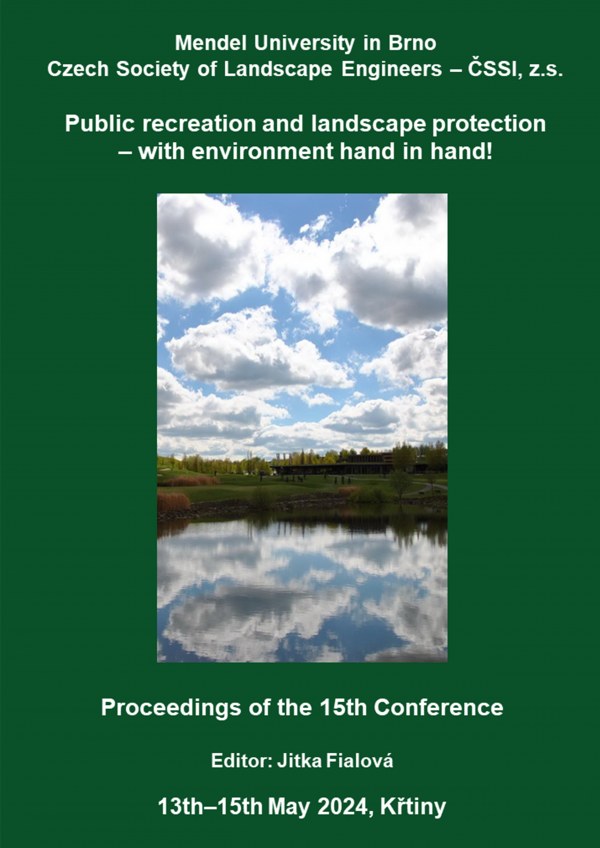
DOI: 10.11118/978-80-7509-963-1-0403
YOUTHS PERCEPTIONS OF AGROFORESTRY IN UGANDA: MOTIVATIONS AND WILLINGNESS TO PARTICIPATE IN HIGHLAND AGROFORESTRY TREE PLANTING AND LANDSCAPE PROTECTION
- Dastan Bamwesigye1,2, Evans Yeboa2, Seval Ozbalci3, Jitka Fialova1, Robert Tweheyo4, Obed Asamoah5
- 1 Department of Landscape Management, Faculty of forestry and Wood Technology, Mendel University in Brno, Zemědělská 3, 613 00 Brno, Czech Republic
- 2 Department of Forest and Wood Products Economics and Policy, Faculty of Forestry and Wood Technology, Mendel University in Brno, Czech Republic
- 3 University of the People, Department of Business Administration, 595 E. Colorado Boulevard. CA 91101, USA
- 4 Department of Social Work and Social Administration, Kyambogo University. P.O Box 1, Kyambogo, Kampala, Uganda
- 5 School of Forest Sciences, University of Eastern Finland, Street Address: Yliopistokatu 7, P.O. Box 111, 80101 Joensuu, Finland
This study investigates public (youths) willingness to participate in highland agroforestry tree planting initiatives and perceptions of agroforestry in Uganda. Through a questionnaire survey (N= 1138), data were collected on respondents' willingness to engage in agroforestry activities, motivations for participation, preferred methods of participation, and perceptions of agroforestry effectiveness. Results indicate a strong overall willingness among respondents to participate in highland agroforestry tree planting, with 89.3% expressing willingness. Primary motivations for participation include environmental conservation, water regulation, and soil conservation. Younger respondents and those with higher education levels demonstrated a greater willingness to participate, suggesting that demographic factors influence attitudes towards agroforestry. Planting tree strips emerged as the preferred method of participation, followed by planting indigenous tree species and practising sustainable agriculture methods. While respondents generally rated agroforestry effectiveness moderately, they perceived land and forest degradation in Uganda as significant issues. These findings underscore the potential for expanding agroforestry practices in Uganda's highlands and highlight the importance of targeted outreach and education to engage diverse demographic groups in environmental conservation efforts and support for Eco-Tourism. Future research should focus on optimizing agroforestry interventions to address perceived barriers and enhance their effectiveness in mitigating land and forest degradation, and possible impact on Eco-Tourism in the region.
Keywords: Agroforestry, Eco-Tourism, Environmental conservation, Landscape Protection, Ugandan Highland
pages: 403-407, Published: 2024, online: 2024
References
- Asare, R., Asaah, E., Foli, G., & Amissah, L. (2019). Assessing the Willingness of Farmers to Adopt Agroforestry as a Climate Change Adaptation Strategy in Ghana. Sustainability, 11(11), 3104.
- Bamwesigye, D. and Hlavackova, P., 2018. Forest wood production in Tropical Africa. J. Landsc. Manag, 9, pp.39-45.
- Bamwesigye, D., Kupec, P., Chekuimo, G., Pavlis, J., Asamoah, O., Darkwah, S. A., & Hlaváčková, P. (2020a). Charcoal and wood biomass utilization in Uganda: the socioeconomic and environmental dynamics and implications. Sustainability, 12(20), 8337.
 Go to original source...
Go to original source... - Bamwesigye, D. (2023). Willingness to Pay for Alternative Energies in Uganda: Energy Needs and Policy instruments towards Zero Deforestation 2030 and Climate Change. Energies 2023, 16, 980.
 Go to original source...
Go to original source... - Bamwesigye, D., Hlavackova, P., Sujova, A., Fialova, J., & Kupec, P. (2020b). Willingness to pay for forest existence value and sustainability. Sustainability, 12(3), 891.
 Go to original source...
Go to original source... - Bamwesigye, D., Doli, A., & Hlavackova, P. (2020c). Redd+: An analysis of initiatives in east africa amidst increasing deforestation. European Journal of Sustainable Development, 9(2), 224-224.
 Go to original source...
Go to original source... - Carrasco, L. R., Larrosa, C., Milner-Gulland, E. J., & Edwards, D. P. (2020). Impact of community forest management on human well-being in three Central African countries. Conservation Biology, 34(1), 140-150.
- Franzel, S., Coe, R., Cooper, P. J. M., Place, F., & Scherr, S. J. (2004). Assessing the adoption potential of agroforestry practices in sub-Saharan Africa. Agricultural Systems, 81(3), 253-272.
- Garrity, D. P., Akinnifesi, F. K., Ajayi, O. C., Weldesemayat, S. G., Mowo, J. G., & Kalinganire, A. (2010). Evergreen agriculture: a robust approach to sustainable food security in Africa. Food Security, 2(3), 197-214.
 Go to original source...
Go to original source... - Jose, S. (2009). Agroforestry for ecosystem services and environmental benefits: an overview. Agroforestry Systems, 76(1), 1-10.
 Go to original source...
Go to original source... - Kiptot, E., Hebinck, P., & Franzel, S. (2014). Comparing agroforestry systems' adoption processes and contributions to household income in Western Kenya. World Agroforestry Centre (ICRAF).
- Lasco, R. D., Delfino, R. J. P., Catacutan, D. C., Simelton, E. S., & Wilson, D. M. (2014). Local people's knowledge, perceptions, and attitudes towards forests: Implications for forest management around Mount Makiling Forest Reserve (MMFR), Philippines. Journal of environmental management, 145, 35-46.
- Mercer, D. E., Runge, C. F., & Garrett, J. L. (2012). Measuring the potential contribution of conservation agriculture to crop production in Eastern Africa. Land Degradation & Development, 23(2), 132-142.
- Mbow, C., Smith, P., Skole, D., Duguma, L., Bustamante, M., Crowley, D., & Piabuo, S. (2014). Mitigation of climate change in agriculture (Chapter 11). In Climate Change 2014: Mitigation of Climate Change. Contribution of Working Group III to the Fifth Assessment Report of the Intergovernmental Panel on Climate Change.
- Nair, P. K. R. (2012). Climate-resilient agroforestry systems for the Sahel zone. Journal of Integrative Environmental Sciences, 9(2), 127-140.
- Nair, P. K. R., Garrity, D., & Akinnifesi, F. (2018). Agroforestry-theory and practices. Elsevier.
- Nkonya, E., Mirzabaev, A., & von Braun, J. (2011). Economics of land degradation and improvement in Uganda: a review of the literature and empirical evidence. ZEF-Discussion Papers on Development Policy No. 155.


